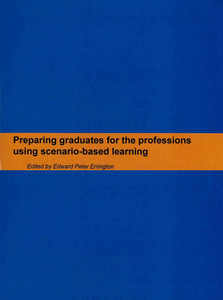Scenario-based learning: an effective transformational tool for cultural diversity
Ireland, Lynette (2010) Scenario-based learning: an effective transformational tool for cultural diversity. In: Errington, Edward Peter, (ed.) Preparing Graduates for the Professions Using Scenario-Based Learning. Post Pressed, Mt Gravatt, QLD, Australia, pp. 177-187.
|
PDF (Published Version)
- Published Version
Restricted to Repository staff only |
||
![[img]](https://researchonline.jcu.edu.au/11883/2.hassmallThumbnailVersion/11638_Errington_2010_Book_Cover.bmp)
|
Image (BMP) (Book Cover)
- Published Version
Download (765kB) |
Abstract
Scenario Based Learning (SBL) is a methodology about fostering thinking and encouraging creation, cooperation and reflection towards discerning analyses of approaches and problems. SBL involves active participation. It situates learners in the act of 'doing'. SBL also sets students in social interactions to respond to scenario situations. But more than this, SBL is designed to engage learners to focus on specific objectives to produce results. Errington (2003, p.10) refers to this process as "purposeful engagement". In the instances cited in this Chapter, links to the intended outcomes are students becoming 'a potential graduate' or 'an intending professional'. Thinking is activated in all stages of the process through learner-centred activity and reflection. Reflection results from individual deliberations and group perspectives when reporting back to the class as a whole. The role of the educator is critical to this methodology. The overall discussion considers the 'how' and the 'why' of the context of the scenario itself. To Facione (1997), the educator must assist students" ... to learn how to learn ... " (p.94).
| Item ID: | 11883 |
|---|---|
| Item Type: | Book Chapter (Research - B1) |
| ISBN: | 978-1-921214-66-0 |
| Related URLs: | |
| Additional Information: | This publication does not have an abstract. The Introduction is displayed as the abstract. |
| Date Deposited: | 08 Sep 2010 00:48 |
| FoR Codes: | 13 EDUCATION > 1399 Other Education > 139999 Education not elsewhere classified @ 100% |
| Downloads: |
Total: 74 Last 12 Months: 5 |
| More Statistics |



